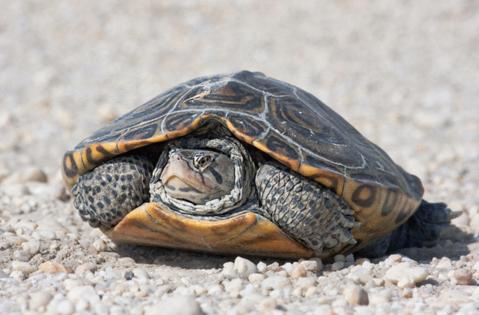Virginia Marine Resources Commission considers requiring devices on crab pots to protect terrapins
Published in News & Features
The Virginia Marine Resources Commission voted to review potential regulations that would require modifications to crab pots to discourage the unintentional capture of diamondback terrapins.
Diamondback terrapins, found all along the East Coast, are the only turtles found in brackish water, and problems begin when they move into areas with crab pots. Specifically, they can get stuck in the submerged pots that are common in Virginia’s waters, especially within 150 feet of the shore, and drown. In some cases, terrapins can follow each other into crab pots, whether or not they have bait inside.
In February, environmental groups signed on to a petition to ask the commission for more strict regulations on crab pots. The petition asked for the commission to require turtle excluder devices, or TEDs, on crab pots. To use a TED, the crabber attaches a small (usually plastic) rectangle into the inner narrow end of the entrance funnels on crab traps, keeping terrapins out of the pot.
The commission denied the petition to require the TEDs on all crab pots. But the commission voted unanimously to review how the devices could be used in recreational crab pots.
At the June 24 meeting, some commissioners expressed concern with how the TED requirement would be enforced for crabbers. To approve the petition, commissioners would have had to agree to it entirely, meaning commercial crabbing operations would be required to use TEDs. Several members of the commission did not want that restriction on commercial operations, but were open to seeing how they could work for recreational crabbers.
“Way too many turtles are killed each year by crab traps, and simple, affordable bycatch reduction devices are the best way to keep these turtles safe,” said Tara Zuardo, a senior campaigner at the Center for Biological Diversity. “We look forward to working with the commission to expand the use of these commonsense measures.”
New York and New Jersey already require bycatch reduction devices on recreational and commercial pots. Delaware, Florida and Maryland require them on just recreational pots.
While terrapins are not considered endangered, advocates of the regulations said the pots pose a sizable risk for the species. Terrapins are considered an important middleman species for local ecosystems; they feed on snails that contribute to erosion, and terrapin eggs feed several predatory birds.
One study cited in the petition found that upwards of 32,000 abandoned crab pots have been found in the Virginia waters of the Chesapeake Bay. The filing also said active and abandoned crab pots can kill 60,000 to 80,000 terrapins each year.
“While we’re disappointed that the commission didn’t move forward with our universal crab pot proposal, it’s great knowing that recreational crabbing could soon be much safer for diamondback terrapins in Virginia,” Zuardo said.
_____
©2025 The Virginian-Pilot. Visit pilotonline.com. Distributed by Tribune Content Agency, LLC.







Comments